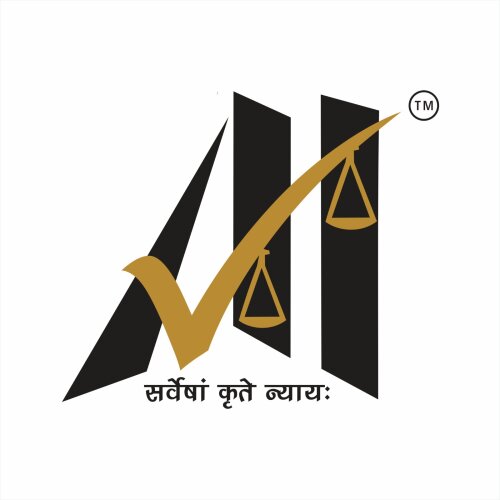Best Sexual Abuse Lawyers in India
Share your needs with us, get contacted by law firms.
Free. Takes 2 min.
Or refine your search by selecting a city:
List of the best lawyers in India
About Sexual Abuse Law in India
Sexual abuse in India is a serious issue affecting individuals across various demographics. Indian law defines sexual abuse as any unwanted sexual activity, with perpetrators often using force or making threats. The Indian Penal Code (IPC) has specific sections dealing with crimes of sexual nature, which are further supported by various amendments to provide more comprehensive legal protection. The most notable legislation includes the Protection of Children from Sexual Offences (POCSO) Act 2012, aimed at safeguarding children against offenses of sexual assault, harassment, and pornography, and the Criminal Law (Amendment) Act 2013, which broadens the scope of punishable sexual offenses.
Why You May Need a Lawyer
Legal representation or consultation is crucial for victims of sexual abuse for several reasons:
- Filing a Complaint: Navigating the process of filing an FIR (First Information Report) with the police.
- Court Representation: Representing the victim in court to ensure justice is served.
- Understanding Rights: Educating victims about their rights under the law.
- Protective Orders: Assisting in obtaining restraining or protective orders against the perpetrator.
- Mediation: Guiding in cases where mediation or conciliatory measures are considered.
- Compensation Claims: Pursuing compensation claims for the victim's hardship and trauma.
Local Laws Overview
Several key legislations address sexual abuse in India:
- Indian Penal Code (IPC): Sections 354 (assault or criminal force on a woman with the intent to outrage her modesty), 375 (rape), and others outline offenses and punishments.
- Protection of Children from Sexual Offences (POCSO) Act 2012: Comprehensive coverage of offenses and penalties related to child sexual abuse.
- Criminal Law (Amendment) Act 2013: Includes offenses like voyeurism, stalking, and sexual harassment with stricter penalties.
- Women and Domestic Violence Act 2005: Addresses sexual abuse within the domestic sphere.
Frequently Asked Questions
What should I do if I am a victim of sexual abuse?
First, seek safety and immediate medical attention if needed. Then, report the incident to the police and preserve any evidence. Contacting a legal professional can guide you through the process.
How do I file a complaint of sexual abuse?
You can file a verbal or written complaint at your nearest police station. Under Section 154 of the CrPC, the police must register your FIR promptly.
Will I have to go to court?
Yes, it is likely you will need to appear in court as part of the legal proceedings. A lawyer can help prepare you for this.
Can children file sexual abuse cases under POCSO?
Yes, children and their guardians can file FIRs under POCSO. The act has provisions to ensure child-friendly reporting and trial procedures.
Is sexual harassment on the streets punishable?
Yes, acts such as whistling, passing comments, or unwelcome gestures fall under sexual harassment and are punishable under Indian law.
What are the penalties for convicted sexual abusers?
Penalties vary from fines to life imprisonment, depending on the severity and details of the crime.
Can I seek compensation for sexual abuse?
Yes, victims can claim compensation through legal channels. It is advisable to consult with a lawyer to understand the process.
Can I move to a different location if I feel unsafe?
Yes, for your safety, you can relocate. A lawyer can assist in ensuring any protective measures required by law are in place.
What are the signs of child sexual abuse?
Signs include changes in behavior, regression, unexplained injuries, and avoidant behavior. It's crucial to consult professionals if abuse is suspected.
Do male victims have protection under Indian sexual abuse laws?
Yes, certain laws like POCSO apply regardless of gender, and recent amendments provide broader protections for all genders under sexual abuse law.
Additional Resources
Here are some organizations and governmental bodies that provide support:
- National Commission for Women (NCW): Provides legal aid and guidance to women across India.
- Childline India Foundation: Offers support and assistance related to child abuse.
- Ministry of Women and Child Development: Implements programs and policies for the protection of women and children.
- Local NGOs: Organizations like RAHI, Jagori, and others provide advocacy, support, and legal assistance.
Next Steps
If you or someone you know needs legal assistance regarding sexual abuse:
- Contact a Lawyer: Seek out a lawyer specializing in sexual abuse cases for consultation.
- File an FIR: Report the incident to the police as soon as possible.
- Connect with Support Organizations: Reach out to NGOs or governmental bodies that provide support.
- Document Everything: Keep detailed records of incidents, correspondence, and evidence.
Remember, taking action can be daunting but is crucial in seeking justice and preventing future incidents. Legal professionals and support organizations are there to help you navigate this process.
Lawzana helps you find the best lawyers and law firms in India through a curated and pre-screened list of qualified legal professionals. Our platform offers rankings and detailed profiles of attorneys and law firms, allowing you to compare based on practice areas, including Sexual Abuse, experience, and client feedback.
Each profile includes a description of the firm's areas of practice, client reviews, team members and partners, year of establishment, spoken languages, office locations, contact information, social media presence, and any published articles or resources. Most firms on our platform speak English and are experienced in both local and international legal matters.
Get a quote from top-rated law firms in India — quickly, securely, and without unnecessary hassle.
Disclaimer:
The information provided on this page is for general informational purposes only and does not constitute legal advice. While we strive to ensure the accuracy and relevance of the content, legal information may change over time, and interpretations of the law can vary. You should always consult with a qualified legal professional for advice specific to your situation.
We disclaim all liability for actions taken or not taken based on the content of this page. If you believe any information is incorrect or outdated, please contact us, and we will review and update it where appropriate.
Browse sexual abuse law firms by city in India
Refine your search by selecting a city.

















